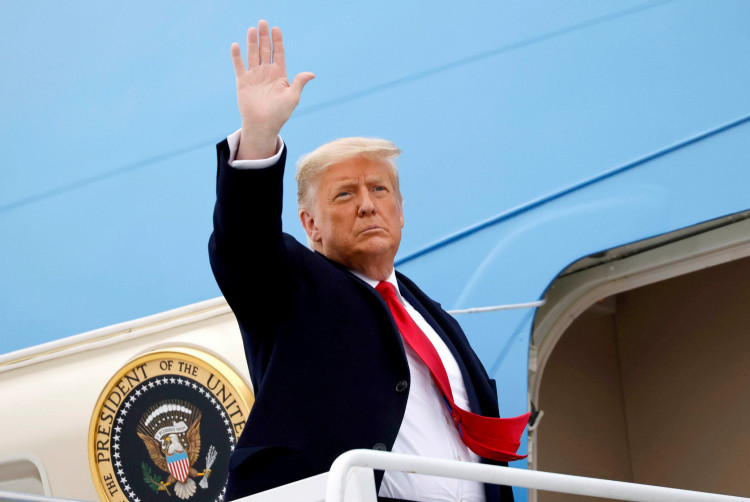President Donald Trump announced Saturday that the United States has carried out direct airstrikes on three of Iran's nuclear facilities, escalating a volatile military campaign initially led by Israel. The move, described by the White House as a "very successful attack," marks a dramatic shift in U.S. policy and raises the risk of a broader regional conflict.
"We have completed our very successful attack on the three Nuclear sites in Iran, including Fordow, Natanz, and Esfahan," Trump posted on Truth Social. "All planes are now outside of Iran air space. A full payload of BOMBS was dropped on the primary site, Fordow. All planes are safely on their way home."
The operation, which involved multiple B-2 stealth bombers capable of deploying the 30,000-pound GBU-57 bunker-busting bombs, targeted Iran's deeply buried uranium enrichment facilities. Fordow, widely regarded as the most fortified of Iran's nuclear sites, had long been considered unreachable without U.S. intervention due to its depth and protection.
An Israeli official confirmed the U.S. notified Israel in advance. The decision to strike followed a week of intensive Israeli operations against Iranian air defenses, missile systems, and nuclear infrastructure, which Israeli commanders said had cleared the way for deeper penetrations.
Trump, who campaigned on withdrawing the U.S. from costly foreign wars, had hesitated to join the conflict, repeatedly stating he preferred diplomacy. "I will make my decision whether or not to go within the next two weeks," he told reporters just two days prior. The White House now says those two weeks were compressed by Iran's refusal to engage.
Trump is expected to address the nation at 10 p.m. Eastern Time, calling the strikes a "HISTORIC MOMENT FOR THE UNITED STATES OF AMERICA, ISRAEL, AND THE WORLD." He added, "IRAN MUST NOW AGREE TO END THIS WAR."
The strikes mark the first time U.S. bombers have targeted Iran's nuclear infrastructure since Trump withdrew from the 2015 Joint Comprehensive Plan of Action in 2018. That deal, brokered by the Obama administration, lifted sanctions in exchange for limits on Iran's uranium enrichment. Trump called it "the worst deal ever" and has long insisted Iran must not obtain a nuclear weapon.
The International Atomic Energy Agency has confirmed that Iran is enriching uranium at Fordow to 60% purity. While Israel had struck Iran's Natanz facility earlier this year, experts said only the U.S. Air Force possessed the capability to strike Fordow effectively.
The use of the GBU-57 bomb, which can penetrate up to 200 feet of hardened rock and concrete, was central to the operation. A U.S. defense official said multiple successive strikes were used to "drill" into the fortified complex.
Iran has not acknowledged the strikes. In the hours before the attack, Iranian Supreme Leader Ayatollah Ali Khamenei warned that American involvement will "result in irreparable damage for them." Foreign Ministry spokesman Esmail Baghaei called any U.S. action "a recipe for an all-out war in the region."
The move has triggered widespread concerns about retaliation. Iran-backed Houthi militants in Yemen have threatened to resume attacks on U.S. naval vessels in the Red Sea, a campaign paused under a U.S.-brokered deal in May.
The U.S. Embassy in Tel Aviv has begun offering assisted departure flights for Americans, the first since the Hamas-led assault on Israel in October 2023. The Pentagon has repositioned warships and aircraft in the region to protect U.S. bases and allies from potential Iranian reprisals.
Behind the scenes, Trump made a final diplomatic push through backchannel efforts in Istanbul, facilitated by Turkish President Recep Tayyip Erdoğan. He reportedly considered dispatching Vice President J.D. Vance or personal envoy Steve Witkoff to meet Iranian officials. The plan collapsed when Khamenei, reportedly in hiding, refused to authorize any engagement.
Israeli officials had pressed Trump to authorize the strikes, arguing that Iran was approaching nuclear breakout capability. "They can break through a little section," Trump said of Israel's military, "but they can't go down very deep."
Trump's decision has split his domestic base. While many Republican lawmakers supported the strikes, some in his populist camp expressed concern over entanglement in another foreign war. Conservative commentator Tucker Carlson criticized the escalation, calling it a betrayal of Trump's non-interventionist promises.
Despite the backlash, Trump defended his actions, stating on social media, "We know exactly where the so-called 'Supreme Leader' is hiding... We are not going to take him out (kill!), at least not for now."
Israel's military has said it is preparing for a prolonged campaign. Iranian Foreign Minister Hossein Amir-Abdollahian warned that U.S. involvement "would be very, very dangerous for everyone."





